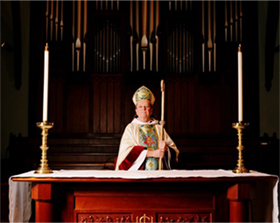
Robinson, who retired in 2013 as the Bishop of New Hampshire, and his partner of 25 years, Mark Andrew, were married in a private civil union in 2008. The announcement was made public Saturday (May 3) in a statement to the Diocese of New Hampshire.
“As you can imagine, this is a difficult time for us — not a decision entered into lightly or without much counseling,” Robinson wrote in a letter. “We ask for your prayers, that the love and care for each other that has characterized our relationship for a quarter century will continue in the difficult days ahead.”
He explained his views on marriage and divorce further in a column for the Daily Beast.
“It is at least a small comfort to me, as a gay rights and marriage equality advocate, to know that like any marriage, gay and lesbian couples are subject to the same complications and hardships that afflict marriages between heterosexual couples,” Robinson wrote.
Hundreds of parishes left the Episcopal Church in protest of his controversial consecration.
“Whenever you choose to or are called into living a public life, one of the prices you pay for that is public scrutiny, so it’s not surprising that people will pay attention to this,” said Susan Russell, an Episcopal priest at All Saints Church in Pasadena, Calif., and past-president of the LGBT advocacy group Integrity USA.
Robinson, 66, is now a fellow at the Center for American Progress in Washington, D.C.
“My belief in marriage is undiminished by the reality of divorcing someone I have loved for a very long time, and will continue to love even as we separate,” Robinson wrote in his column. “Love can endure, even if a marriage cannot.”
Due to changes in New Hampshire laws on same-sex marriage, Robinson became legally married to his partner when they didn’t opt out of the change in state law, according to Russell.
In 2012, the Episcopal Church voted to allow bishops to permit priests to bless same-sex marriages. Russell said further discussion about the church’s canon law and prayer book in relation to LBGT concerns will be held at the denomination’s convention next year.
Robinson went public with his sexual identity and divorce from his wife in 1986. He has since been open about the heavy toll he has faced under public scrutiny. Four years ago, he underwent treatment for alcoholism.
Robinson declined to speak further in an interview.
Critics say Robinson’s actions defied scriptural authority and thousands of years of Christian tradition. His divorce could fuel the fire, said Douglas LeBlanc, an Episcopalian who reported on Robinson’s consecration when he was an editor at Christianity Today.
“I’m sure there might be some conservatives who might say, ‘We told you so all along, if you depart from church teachings on homosexuality, you’re opening the door to all kinds of chaos,’” LeBlanc said. “In many ways, I think you are. But I think it’s imperative to say, the House of Bishops is not lacking on heterosexual sin.”
The Episcopal Church’s deliberations on same-sex marriage will likely continue regardless of Robinson’s divorce, LeBlanc said. Some, though, might seize on the news of his divorce.
“People will perhaps rub his nose in this for the rest of his life when he’s debating folks on the sexuality wars,” LeBlanc said. “It probably won’t shock a lot of people and will sadden a lot of people, too.”
Robinson is no longer the only openly gay bishop in the Episcopal Church. Bishop Mary D. Glasspool was consecrated in Los Angeles in 2010.
In the past decade, the Episcopal Church followed the decline in other mainline Protestant denominations and lost about 10 percent of its members. It had about 1.8 million members in 2012, the last year for which statistics are available.








